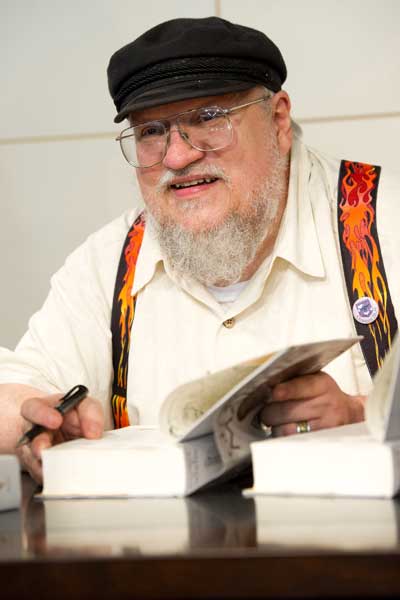A Dance with Dragons, By George RR Martin

Your support helps us to tell the story
From reproductive rights to climate change to Big Tech, The Independent is on the ground when the story is developing. Whether it's investigating the financials of Elon Musk's pro-Trump PAC or producing our latest documentary, 'The A Word', which shines a light on the American women fighting for reproductive rights, we know how important it is to parse out the facts from the messaging.
At such a critical moment in US history, we need reporters on the ground. Your donation allows us to keep sending journalists to speak to both sides of the story.
The Independent is trusted by Americans across the entire political spectrum. And unlike many other quality news outlets, we choose not to lock Americans out of our reporting and analysis with paywalls. We believe quality journalism should be available to everyone, paid for by those who can afford it.
Your support makes all the difference.It is hard to accept that something that enormous and that popular can be as good as people tell you it is. A Song of Ice and Fire, George RR Martin's vast fantasy epic – simply reading that phrase will close some minds instantly – has been appearing at irregular intervals since 1996. It is now being adapted as a television series. The first season, A Game of Thrones, recently aired on HBO and Sky Atlantic.
It would be easy, and entirely wrong, to dismiss it as yet another thin pseudo-medieval imitation of Tolkien. Any consideration of Martin's strengths, and weaknesses, has to start from understanding precisely what he is trying to do. Like the best contemporary fantasists, he is not imitating Tolkien or even arguing with him.
Much fantasy deals either with the plot trope that can be called the Quest for the Cure for the World's Pain, or with the Reconciliation of Faerie and the Mundane. Much – like Tolkien – deals with both. Martin concentrates on a third - genuinely medieval - trope, always inherent in the big heroic fantasy but rarely central save in the first book of TH White's Arthur novels. This trope we may as well call The Mirror of Magistrates, or, with Machiavelli, The Prince.
Part of the plot Martin has constructed involves not just the endless civil wars of the kingdom of Westeros – which sounds like England in the Wars of the Roses until you realise that it is the size of Latin America – but something rather more apocalyptic. "Winter is coming," we are constantly told. The series' title refers, most obviously, to an impending battle between literal dragons and zombie-controlling ice-creatures in the far North.
What has become progressively clear is that the title also refers to the struggle for balance, in people aspiring to rule both the kingdom and themselves: between passion and intellect, between empathy and ambition, between honour and cold-heartedness. Martin has a vast cast precisely to show us all the ways in which people fall short, and die.
In the first volume, for example, we saw Eddard Stark, a man betrayed to his death by his own honour and compassion, as well as Khal Drogo, a potential world-conqueror killed by an infected wound from a petty duel. Robert Baratheon seized a throne and then had no idea what to do with it save drink and whore.
By this fifth book, the major characters and contenders are becoming clear. They include Drogo's widow Danaerys, heir of the dynasty Eddard and Robert deposed, now using her new-hatched dragons in a campaign to free slaves. Jon Snow is Eddard's bastard and Lord Commander of the vast ice wall which protects Westeros from the people and creatures of winter, and Tyrion a brilliant drunken dwarf, in exile under suspicion of poisoning his nephew King Joffrey and killing his own father. These three characters were largely absent from the previous volume, A Feast for Crows. All are deeply flawed, yet all have started to learn to adapt and survive.
Martin's world is a richly peopled one. The viewpoints here include a superannuated knight without reproach, a trainee assassin and the disgraced queen whose adultery and incest were among the sparks of conflict. This is a dark world full of evocatively sordid cityscapes and war-ravaged landscape. Few of the "good" characters are without flaw, though several villains - like Bolton and his son Ramsay - are utterly without redeeming features.
The medievalism makes no concessions to prettinesss. This is a world of torture, rape and casual murder graphically portrayed. If you fail at the game of thrones, you die – if you are lucky.
Roz Kaveney's 'Superheroes!' is published by IB Tauris
Join our commenting forum
Join thought-provoking conversations, follow other Independent readers and see their replies
Comments